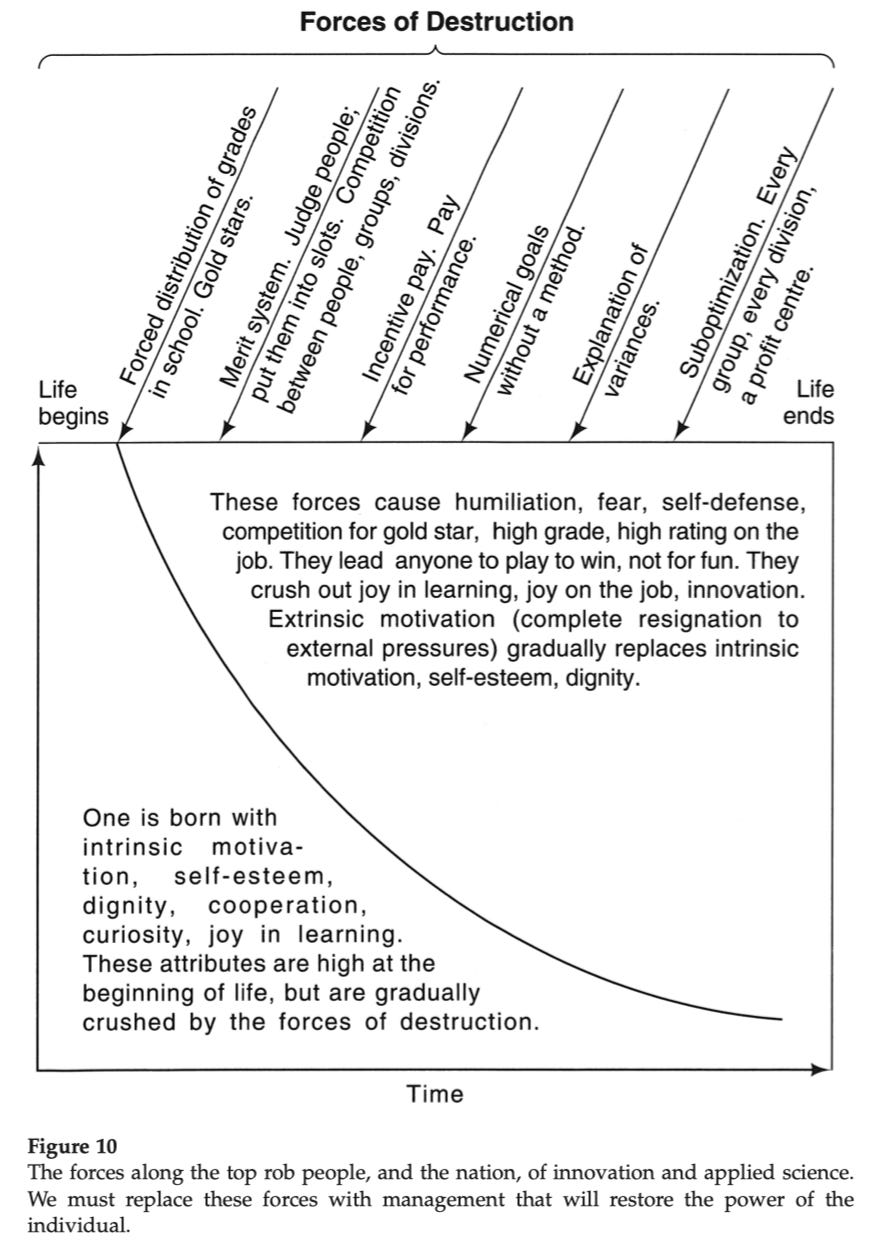Extrinsic motivation is submission to external forces that neutralize intrinsic motivation. Pay is not a motivator. Under extrinsic motivation, learning and joy in learning in school are submerged in order to capture top grade. On the job, joy in work, innovation, becomes secondary to a good rating. Under extrinsic motivation, one is ruled by external forces. He tries to protect what he has. He tries to avoid punishment. He knows not joy in learning. Extrinsic motivation is a zero-defect mentality.
Removal of a demotivator does not create motivation.
- Dr. W.E. Deming as quoted in Orsini, Joyce. The Essential Deming. (p. 81)
Some extrinsic motivation helps build self esteem. But total submission to extrinsic motivation leads to destruction of the individual, as Figure 10 in Chapter 6 exhibits. Joy in learning are submerged to capture top grades. On the job, under the present system, joy in work, and innovation become secondary to a good rating. Extrinsic motivation in the extreme crushes intrinsic motivation.
A bonus for high rank in the ranking of people, teams, divisions, regions, brings demoralization to all the people concerned, including him that receives the bonus.
I repeat here Norb Keller’s famous statement made on 8 November 1987 in a meeting in General Motors: “If General Motors were to double the pay of everybody commencing the first of December, performance would be exactly what it is now.”
He was of course talking about pay above that needed to maintain quality of life. He also meant to include everybody, not just a select group.
- Dr. W.E. Deming, The New Economics, 3rd ed. (p. 74)
The idea of a merit rating is alluring. The sound of the words captivates the imagination: pay for what you get; get what you pay for; motivate the people to do their best, for their own good.
The effect is the exact opposite of what the words promise. Everyone propels himself forward, or tries to, for his own good, on his own life preserver. The organization is the loser.
Merit rating rewards the people that do well in the system. It does not reward attempts to improve the system. Don’t rock the boat.
- Dr. W.E. Deming, Out of the Crisis. (p. 102)
IF you run a cursory keyword search for “motivate” on the Harvard Business Review site, you’ll get a deluge of hundreds of articles spanning decades on the topic of how to get teams and employees excited or motivated to take on the daily work. Some, like Ron Carucci’s 2018 piece on What Not to Do When You’re Trying to Motivate Your Team, offer good advice that I’d say is quite consistent with a Deming perspective:
Motivation is not something you do to people. People ultimately choose to be motivated — when to give their best, go the extra mile, and offer radical ideas. The only thing leaders can do is shape the conditions under which others do, or don’t, choose to be motivated. But the final choice is theirs.
He goes on to offer suggestions that fall quite well under Deming’s advice to managers “to understand what’s important to an individual”. I think were he around today he would smile and offer to Carucci that he thinks he’s on to something…
Dr. Deming observed in his experience how management’s and society’s acceptance and use of extrinsic motivation had contributed toward “heavy losses” for America’s competitive place in the world by wasting people’s hard work and best efforts on things that would improve neither product nor service, and could actually destroy businesses and organizations.
At its simplest, extrinsic motivation is the theory of getting people to do what you want through judicious use of rewards and punishments. To a certain extent, they work, and can work well. Dan Pink observes in Drive that if the work is mechanical or menial, a higher reward can result in higher productivity, but as soon as any cognitive effort is required, diminishing returns are paid. As top-management at Wells-Fargo discovered in 2016, extrinsic rewards and inducements like bonuses and commissions can result in unethical employee behaviours, and did the same at TD Canada Trust in 2017 and Bell Canada in 2018. It also causes a lot of anxiety, stress, depression, and burnout.
Deming called the fallout for individuals the forces of destruction, which began in childhood and continued over their lifetime.
The Paradox of Motivation
In Peter Scholtes’ The Leader’s Handbook, he deftly (and devastatingly) describes extrinsic motivation as a paradox where we act in ways contrary to our own beliefs. Recall how in On Tyranny I shared how Deming is trying to help us escape a prison created by the ways we choose to interact? This is what he’s talking about:
Consider the implications of someone being able to motivate you to a higher level of performance through some kind of reward. What this would say about you is that you have been withholding some reservoir of effort, waiting for it to be bribed out of you. None of us would say that about ourselves. Nor do we say that others are holding back, waiting for a bribe. However, with our contests and merit pay and incentive bonuses we act as though it were true.
- Peter Scholtes. The Leader’s Handbook. (p. 38)
The conceit in this theory of management is that the fault for engagement lies with the employee and not the design of the work and the system, affirming in the minds of management, as Dr. Joyce Orsini observes in her 1987 paper, Bonuses: What’s the Impact?, “the assumption that employees are not doing their best, and that the promise of a bonus is going to motivate employees to work harder.” and concludes, “This is a misguided notion. Employees generally are doing the best they can. Working harder is not the answer.” (p. 182) Moreover, it’s an example of abdication of leadership by setting targets without methods to achieve them.
Consequences
Relying on extrinsic motivation causes myriad problems:
Destruction of teamwork and cooperation
Destruction of the individual’s self-esteem, joy in work
Loss of customers due to complaints, inattention to results
Creation of parallel work systems or black markets to “get around” the plans
Forestalling any system improvements in favour of local sub-optimizations to meet short-term goals
Coach’s ProTip: Observe how team behaviours change as you get closer to performance appraisals.
Reflection Questions
Recently, I read an article about Eric Barone, the developer behind a popular video game, Stardew Valley, and how he devoted four years of his life to creating it. This is an extreme example of the polar opposite of extrinsic motivation, what Deming called intrinsic motivation. It comes from within the individual who finds significant pleasure in their work and does it well out of a sense of personal satisfaction and fulfillment.
Consider Dr. Deming’s thoughts on extrinsic and intrinsic motivation. In your opinion, do they still hold true today? How has extrinsic motivation been used on you? How did it affect your performance and relationships with others? Under what circumstances would you use extrinsic motivation? What would be required for leadership to change their minds and move toward intrinsic motivation? How could the work systems be better designed?
Extra Credit Reading
Frederick Herzberg’s classic 1968 HBR paper on extrinsic motivation, One More Time: How Do You Motivate Employees.




